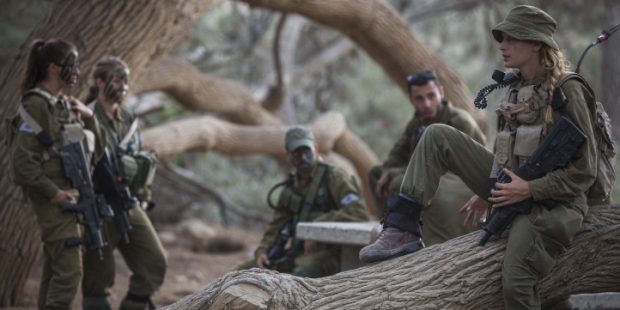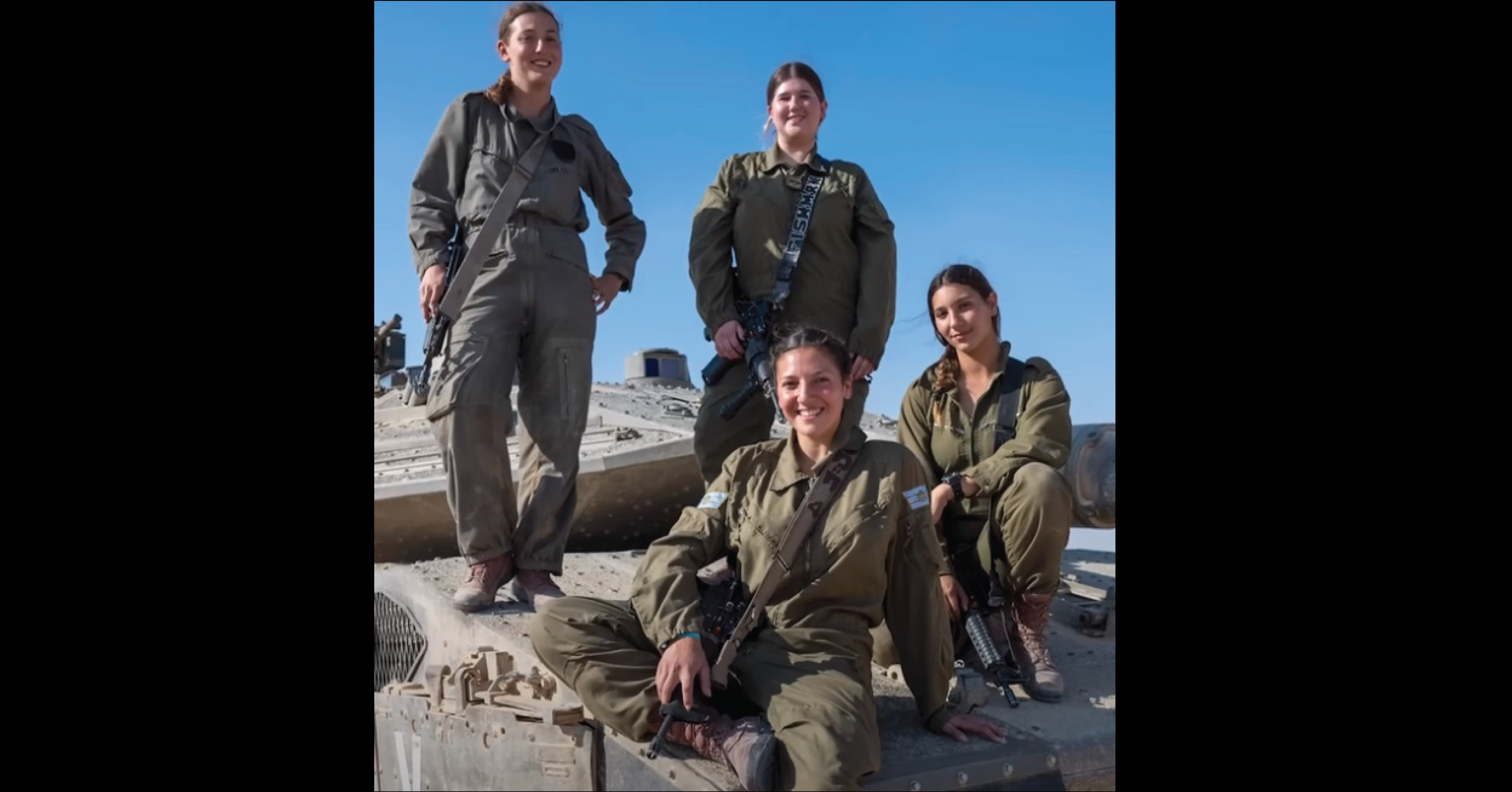Mixed Gender Israeli Soldiers Fight Old Ideas and New Foes
October 31, 2016


Soldiers of the Caracal Battalion seen resting before beginning a 16 Kilometer journey overnight to complete their training course, in Azoz village, southern Israel, near the border with Egypt, September 3, 2014. Formed in 2004, the Caracal Battalion is an infantry combat battalion of the Israel Defense Forces, composed of both male and female soldiers, which is stationed along the Egyptian border. Most of the Caracal soldiers are female. Photo by Hadas
While the country’s — and world’s — eyes have been focused on Israel’s borders with Syria, Lebanon and Gaza, it is the Sinai border that is unequivocally the most active.
On an almost nightly basis, Egyptian smugglers, most of them Bedouin, come to the 125-mile (200-kilometer) border fence to toss bags of contraband to their Israeli counterparts, who collect the goods in ATVs or — on a big night, in trucks — and bring them back for distribution, soldiers serving on the border told The Times of Israel.
But while stopping drug runners is almost routine, the real threat from Sinai is the Islamic State group, which is currently occupied in a vicious war with Egyptian forces, but is expected one day to turn its eyes to the Jewish state.
The people addressing that threat on the Sinai border are the men and women of the Caracal Battalion, one of the IDF’s three — soon to be four — mixed-gender combat battalions.

While the smugglers they face on an almost daily basis generally do not have ties to terror groups, they are often far from peaceful. They have routinely opened fire indiscriminately when confronted by Israeli troops, forcing them to take cover while the smugglers make their escape.
Earlier this year, Sgt. Anna Zagoda’s unit learned that lesson all too well. Her squad had suspected something was up when a Land Cruiser SUV zipped past their jeep near the border fence at 8:30 p.m. on the night of Holocaust Remembrance Day, May 4, miles from the closest town.

Sgt. Anna Zagoda, part of the IDF’s mixed-gender Caracal Battalion that guards Israel’s border with Egypt’s Sinai Peninsula. (Judah Ari Gross/Times of Israel)
“It was clear to me that this wasn’t normal,” she said.
After the SUV sped by them, the unit’s vehicle — a lightly armored vehicle known as a David — was suddenly sprayed with “massive” machine gun fire from the Egyptian side of the border.
Judging by the size of the SUV on the Israeli side of the border, it seems the squad from the co-ed Caracal Battalion had interrupted a large smuggling attempt.
It wasn’t entirely a surprise. They’d gotten some advanced intelligence telling them that something might happen that night.
As the squad was pounded with bullets, the soldiers took cover and radioed in the details, she said.
She passed along the message to the unit’s control center in Nitzana, about 25 miles (40 kilometers) south of the Gaza Strip, which contacted the Egyptian side, said Zagoda, who has since gotten out of the army.
Egyptian police promptly sped over and arrested the criminals.
According to Lt. Shir Shachar, who leads a team of tatzpitaniyot, or watchers in Hebrew, that monitors the border through closed circuit security cameras placed along the fence, these smuggling attempts happen “something like five times a week,” if not “once a day.”
Some of these occur before Israeli forces can make it to the area in order to prevent them, while others play out much in the same way as the Caracal unit’s encounter — a “shower” of bullets, but everyone coming out unscathed.

Cpt. Or Ben-Yehuda shakes hands with former head of the IDF’s Southern Command Maj. Gen. Sami Turgeman while she was recuperating from wounds sustained in an attack by smugglers in October 2014. (IDF Spokesperson’s Unit)
Though not all of them end without injury. In October 2014, a different Caracal patrol, commanded by Cpt. Or Ben-Yehuda, came under fire from both machine guns and an anti-tank missile. Ben-Yehuda, along with another soldier, were wounded in the attack. Three of the assailants were killed.
Ben-Yehuda, who continued to command her troops after she was injured, was later awarded with a citation from the then-head of the Southern Command Maj. Gen. Sami Turgeman.
The first line of defense are those tatzpitaniyot, who have to be constantly vigilant and mentally strong, Shachar said. They scan the border for terrorist infiltrations and smuggling attempts, and they watch other soldiers confront the attackers and criminals — like in the case of Ben-Yehuda’s unit — while incapable of directly affecting the outcome.
“It’s not easy in the beginning,” Shachar said. “It’s not easy in the end either.”
War on drugs
For nearly a decade, the men and women of the Caracal Battalion have been guarding the Sinai border.
Up until 2013, the Egyptian-Israeli border was something out of the Wild West — a sprawling desert with ample room for the smuggling of drugs, weapons, cigarettes and sex slaves.
The base at Nitzana still fits that Wild West backdrop. It’s dusty and full of flies. A stray dog sleeps in the shade of the stairwell in the building where Shachar’s tatzpitaniyotoperate.

Today, the situation on the border is tense and active with drug smuggling, but it’s been free of terror attacks for more than four years, after a number of incidents in the years prior.
Following an insurgency in the Sinai, terrorists carried out multiple attacks against Israel in 2011 and 2012. In one multi-staged attack in August 2011, six Israeli civilians, an IDF soldier and a counter-terrorism police officer were killed.
Prior to 2013, African migrants, many of them fleeing oppressive and violent regimes, also entered Israel by the thousands through the porous border.
In response, Israel constructed the nearly 20-foot tall barrier, which was completed in January 2013.

The new steel fence sent the price of hashish in Israel soaring and stemmed the flow of African migrants almost completely, from thousands each year to dozens.
But while vast quantities of marijuana and other drugs could no longer make it across the border, some intrepid entrepreneurs from Sinai still smuggle illicit products — like heroin — into Israel.
A video released on Arab media (see below) in late July shows the ease with which this can be accomplished.
Smugglers on the Israeli side arrive at the scene. Their Egyptian counterparts come up to the fence and toss over bundles of contraband. The Israelis grab them and then hightail it out of there.
On Tuesday, Egyptian security forces believed that 15-year-old Nimer Bassem Abu Amar, a civilian contractor who had been working on the security fence between Israel and Sinai, had been such a smuggler and shot him dead, according to an initial investigation.
If an IDF patrol can stop a smuggling attempt, it does. But it’s not the army’s main goal, that’s the domain of the Israel Police. And commanders like Zagoda are neither inclined — nor expected — to sacrifice their soldiers’ lives over heroin.
“I don’t want a soldier to die for drugs,” the sergeant said.
Fighting terrorists
But of course drugs aren’t the real risk on the Sinai border — terrorists are, according to Maj. Shachar Nachmi, deputy commander of the Caracal Battalion.
In August 2012, a group of terrorists from Sinai ambushed an Egyptian base, killing some 16 soldiers and making off with two armored personnel carriers, which they used to ram through the Kerem Shalom crossing.
One APC exploded near the crossing, while the second made it approximately 1.25 miles (2 kilometers) inside Israel, sustaining attacks from infantrymen and tanks, before it was stopped by an Israeli Air Force missile.

A month later, three Egyptian terrorists from Ansar Bait al-Maqdis, which would later become the Islamic State’s affiliate in Sinai, attacked a group of Israeli soldiers stationed near Mount Harif, the area along the border where Nimer Bassem Abu Amar, the 15-year-old contractor, was killed Tuesday.
They were armed with explosives, rocket-propelled grenade launchers and AK-47 assault rifles. In the resulting firefight, the three terrorists were killed, along with an IDF soldier. A second Israel trooper was moderately wounded.
Since then Ansar Bait al-Maqdis, which renamed itself Wilayat Sinai in 2014, has been engaged in a vicious war with the Egyptian military, resulting in relative calm along the border. However, the bombing of a Russian airplane last year, for which Wilayat Sinai claimed credit, showed that the group was not to be discounted. The IDF has said it expects the terrorist group will eventually take another shot at Israel.
“The border is now threatened by Daesh,” Nachmi said, using the Arabic term for the Islamic State.
Another Israeli official, speaking to the British Telegraph newspaper last month, warned: “It could happen today, tomorrow, in a month but within the next six months we will come into an engagement with Wilayat Sinai.”
And that is precisely what the Caracal soldiers are preparing to defend against.
“The reason why we deal with smugglings so much is so they won’t become terror,” Zagoda said. “A place that can be used for smuggling is a place that can also be used to infiltrate.”
In addition, something that starts out as a criminal smuggling attempt can easily turn into a much more serious security threat, as Capt. Or Ben-Yehuda discovered in 2014.
“You don’t know how it will develop. In an HTA (hostile terrorist activity), the letters H-T-A aren’t going to be written on their foreheads,” Zagoda said. “So you always need to be ready. You need to be ready for the time their sacks are full of explosives and not just drugs.”
Accepting female comrade in arms
The Caracal Battalion has been guarding on the Egyptian border since 2007. Last year another mixed-gender battalion, the Lions of the Jordan Battalion, or Ariyot Hayarden in Hebrew, took up positions along the Jordan Valley.
Within the next year a third co-ed battalion, known as Cheetah, or Bardelas, which was first created in 2015, will guard the borders of the Arava Desert in southern Israel.
The mixed-gender units are approximately 65 percent female and 35% male, Nachmi said.
Soon the country’s two longest borders — with Egyptian and Jordan — will be defended almost exclusively by these mixed-gender, but mostly female, battalions. This is part of a growing trend of female combat soldiers taking over duties that were previously carried out by the IDF’s infantry brigades — Golani, Paratroopers, Givati and others.

Under IDF Chief of Staff Gadi Eisenkot, the IDF has been working to cut away its inefficiencies and hone itself into a lean, mean fighting machine.
One place it found to streamline was on the borders, where lighter combat units, which have lighter physical demands and less training, could replace the more “valuable” heavy infantry units, which could in turn focus on the more imminent threats to national security coming from Lebanon, Gaza and the West Bank.
This move has not been without controversy.
There are some very real concerns about replacing infantry units, which have objectively higher degrees of training and physical requirements, with combat units that have some lower standards. The army has responded by noting that while there is some impact on operational capability, it only has a finite number of resources and needs to use them to their fullest effect.
But much of the criticism against these units also deals with more tenuous and subjective issues like morale and group dynamics.
“The men who are assigned to these units lose their morale. They take off the tags identifying their unit when they come home because they’re embarrassed to serve there,” Raz Sagi, a former IDF officer and researcher who speaks often against the concept of female combat soldiers, told Israel National News.
However, male soldiers serving in Caracal on the border denied any discomfort from having female comrades in arms.

“I can totally trust my female comrades who I was with in training and on the border. There’s no difference. Just like I can carry for them, they can carry for me,” a male soldier, who served under Zagoda during the incident on Holocaust Remembrance Day, said.
Nachmi, the deputy commander of Caracal, agreed with his male soldier’s view, saying the unit had no real morale problems related to gender.
The soldier, who asked not to be named for privacy reasons, said that while he was initially skeptical of female soldiers, once he actually started training alongside them he was “surprised” to see how physically capable they were and now thinks that men and women should always train alongside one another.

The concept of female combat soldiers predates Eisenkot, but has been ramped up since he took over as army chief in early 2015.
Caracal was formed in 2004, expanding on an experimental company formed in 2000. Until 2012, the number of female soldiers serving in the mixed-gender combat unit hovered at approximately 500. In 2013, it jumped up to nearly 900.
When the army opened the Lions of the Jordan Battalion, which meant additional positions were available, the number of women serving in combat units reached 1,365. And with the creation of Cheetah Battalion last year, the number of female combat soldiers passed 2,000, and it is soon expected to reach 2,100, the Yedioth Ahronoth newspaper reported in August.
That represents a 400% increase in the number of female combat soldiers within four years, and it’s not over yet.
A fourth co-ed battalion is slated to be created in the next year. Its name has yet to be revealed, but considering the names of the other three mixed-gender units are all cats native to the Middle East, a Panther Battalion certainly wouldn’t be out of the question.
Similar posts
-

Women's Empowerment in Israel
December 15, 2023In recent decades, Israel has witnessed a remarkable evolution in the status and empowerment of wom...
-

Female Israeli Soldiers Who Defeated 100 Terrorists
December 6, 2023In the aftermath of the October 7 attacks, the valiant all-female unit of the Israeli Defense Force...
-

Israel's Remarkable Female Soldiers
July 26, 2023Introduction When we think of the Israeli military, we often conjure up images of well-trained s...
-

About Gal Gadot's Cleopatra Movie
July 18, 2023By Katy Rath Gal Gadot's new Cleopatra movie has been steeped in both anticipation and controver...
-

Israel is Leading the World in Women’s Health
July 20, 2022Femtech is a field gaining popularity. So much so that a conference for female technological innova...
-

Women to Serve in Combat Roles in Elite IDF Unit
May 27, 2022Unit 669 is one of the four special forces of the IDF. An estimated 90% of the positions in the IDF...
-

IDF Women Not Afraid To Go To Battle
December 14, 2021Sgt. Ofir Weingold, a technician in the IDF's 53rd Armored Battalion, in a tank | Photo: IDF Spo...
-

Record Number of Women to be Protecting Israel's Borders
August 5, 2021Over 300 young women to begin their Border Police training. Due to high demand, the corps is plannin...



















Wow thats awesome